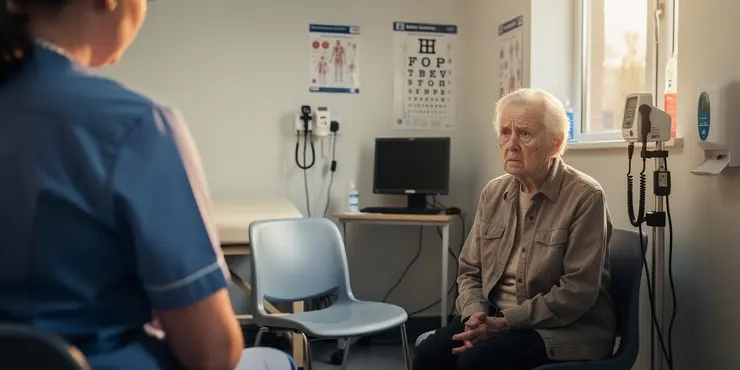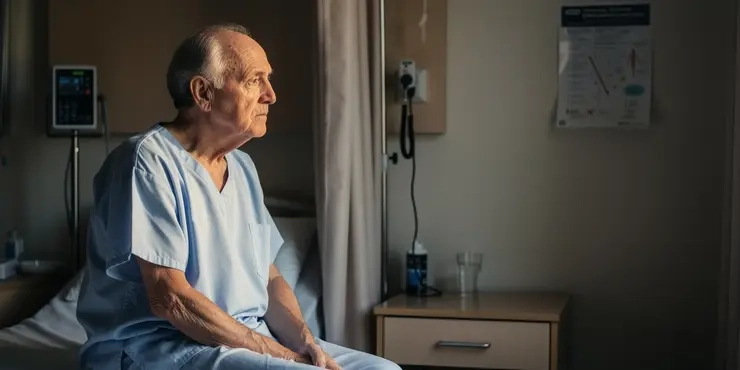Find Help
More Items From Ergsy search
-

Delirium
Relevance: 100%
-

What is Delirium
Relevance: 95%
-

What is delirium
Relevance: 94%
-

The Delirium Question on Patientrack
Relevance: 91%
-

How do you spot delirium
Relevance: 87%
-

Experiencing delirium after surgery
Relevance: 87%
-

Delirium: A Patient Story at Leicester's Hospitals
Relevance: 84%
-

How is ketamine used in veterinary medicine?
Relevance: 13%
-

Can binge drinking lead to addiction?
Relevance: 6%
-
How does binge drinking affect mental health?
Relevance: 5%
How to Spot Delirium
Introduction to Delirium
Delirium is a serious disturbance in mental abilities that results in confused thinking and reduced awareness of the environment. This condition can come on rapidly, often within hours or a few days. Recognizing delirium early is crucial for proper treatment and management, especially in the elderly population. Here's how to identify the signs of delirium.Sudden Onset
One of the hallmark features of delirium is its quick onset. Symptoms appear suddenly, usually within hours or days. Unlike dementia, which develops gradually, delirium's abrupt presentation is often a telltale sign.Fluctuating Symptoms
Symptoms of delirium may fluctuate throughout the day. A person may be relatively alert one moment and highly confused the next. This variability can be an important indicator that delirium, rather than another cognitive issue, is at play.Disorientation
Individuals with delirium often appear disoriented. They may not know where they are, the time of day, or the current date. This can be particularly noticeable if the person was previously aware of these details.Attention Deficits
A significant feature of delirium is difficulty in focusing, sustaining, or shifting attention. A person might seem easily distractible or unable to follow a conversation or instructions.Hallucinations and Delusions
Another key sign is the presence of hallucinations (seeing or hearing things that are not there) or delusions (strongly held false beliefs). These symptoms can be distressing for both the individual and their carers.Speech and Thought Problems
Delirium can affect speech and thought processes. Speech may become slurred, disjointed, or incoherent. Thoughts can become fragmented, and the person may have difficulty expressing coherent ideas.Disturbed Sleep-Wake Cycle
Delirium often disrupts normal sleep patterns. There can be increased confusion at night (known as "sundowning"), and the person may have difficulty sleeping or have vivid dreams and nightmares.Emotional Disturbances
People with delirium can experience rapid mood swings or heightened emotions. Anxiety, fear, irritability, apathy, or euphoria can all be present, and these emotional states can change quickly.Importance of Medical Evaluation
If you suspect someone is experiencing delirium, it is imperative to seek medical evaluation immediately. Delirium can be caused by various factors including infections, medications, or metabolic imbalances, and requires prompt treatment to address the underlying cause. Understanding these signs can help you recognize delirium early and ensure that the individual receives the necessary care. If you’re in the United Kingdom and notice these symptoms, contact your GP or the NHS for guidance and support.How to Spot Delirium
What is Delirium?
Delirium is when a person's mind gets confused and they become less aware of what is around them. This can happen very quickly, sometimes in just a few hours or days. It is important to notice delirium early so the person can get help, especially if they are older. Here’s how to see if someone has delirium.Appears Quickly
Delirium starts very suddenly. It can show up in just a few hours or days. This is different from dementia, which happens slowly over time. If someone changes quickly, it might be delirium.Changes During the Day
With delirium, symptoms can go up and down. Someone might be fine one moment and then very confused the next. These changes are a sign that it could be delirium.Confusion
People with delirium often seem confused. They might not remember where they are, what time it is, or what day it is. This can be noticed if they usually know these things.Trouble Paying Attention
In delirium, people have a hard time concentrating. They might not be able to focus on a conversation or follow instructions well.Seeing or Hearing Things
A person with delirium might see or hear things that aren’t there (hallucinations) or believe things that aren’t true (delusions). This can be scary for them and the people taking care of them.Talking and Thinking Problems
Delirium can make speech unclear or confusing. Thoughts can get mixed up, and the person might struggle to say what they mean.Problems with Sleep
People with delirium might have trouble sleeping. They can become more confused at night or have strong dreams and nightmares.Emotional Changes
Someone with delirium might have quick mood changes. They might feel anxious, scared, irritated, or very happy, and these feelings can change fast.Why See a Doctor?
If you think someone has delirium, it's important to see a doctor right away. Delirium can be caused by things like infections or medicines and needs quick treatment. Knowing these signs can help you spot delirium and make sure the person gets the care they need. If you are in the UK and see these symptoms, call your GP or NHS for help.Frequently Asked Questions
What is delirium?
Delirium is a serious disturbance in mental abilities resulting in confused thinking and reduced awareness of the environment. It often starts suddenly and may have a fluctuating course.
What are common symptoms of delirium?
Common symptoms include sudden confusion, inability to stay focused, disorientation, memory problems, and hallucinations.
What causes delirium?
Delirium can be caused by a variety of factors including infection, surgery, medication side effects, substance withdrawal, and severe illness.
How is delirium different from dementia?
Delirium is usually sudden in onset and temporary, while dementia is a gradual and chronic decline in cognitive function. Delirium is often reversible with appropriate treatment.
Who is at risk for delirium?
Risk factors include advanced age, existing cognitive impairments like dementia, chronic illnesses, severe illness or infection, and polypharmacy (using multiple medications).
Can delirium be prevented?
Delirium may be prevented by managing risk factors such as controlling pain, ensuring proper hydration and nutrition, minimising use of high-risk medications, and promoting a regular sleep-wake cycle.
How is delirium diagnosed?
Diagnosis typically involves a clinical evaluation which includes medical history, physical examination, cognitive assessment, and sometimes additional tests to identify underlying causes.
What treatments are available for delirium?
Treatment focuses on addressing the underlying cause, such as treating infections or adjusting medications. Supportive care to ensure safety and comfort, and sometimes medications to manage severe agitation, may also be necessary.
How long does delirium last?
The duration of delirium can vary widely. It may last only a few hours or several weeks, depending on the underlying cause and the effectiveness of treatment.
What should I do if I suspect someone has delirium?
If you suspect someone has delirium, seek medical help immediately. Delirium can be a sign of a serious medical condition requiring prompt attention.
Is delirium common in hospitals?
Yes, delirium is relatively common in hospitals, especially among older adults and those undergoing surgery or intensive care.
Can delirium lead to long-term complications?
While delirium is often reversible, it can lead to long-term cognitive decline, especially in older adults or those with pre-existing cognitive impairment.
Are there specific medications that can cause delirium?
Yes, medications such as benzodiazepines, opioids, anticholinergics, and certain sedatives are commonly associated with an increased risk of delirium.
How does dehydration relate to delirium?
Dehydration can impair normal metabolic processes and cerebral function, potentially leading to or exacerbating delirium, especially in vulnerable populations like the elderly.
Can sleep disturbances contribute to delirium?
Yes, poor sleep and disruptions in the sleep-wake cycle can contribute to the development or worsening of delirium.
What is delirium?
Delirium is when a person gets very confused and cannot think clearly. This can happen quickly. It might be hard for them to pay attention or understand what is going on around them. They might see things that are not real or get mixed up about where they are.
Delirium can be scary, but there are ways to help. Keeping the room quiet and calm can help. Having family or friends nearby might make the person feel better. It is important to talk to a doctor if someone has delirium.
Delirium is when your brain gets very confused, and it is hard to think clearly. You may not pay attention to what is around you. It can happen quickly and might come and go.
What are common signs of delirium?
Delirium is a sudden change in how you think and feel.
Here are some signs of delirium:
- Feeling confused and not knowing where you are
- Seeing or hearing things that are not there (hallucinations)
- Being very sleepy or not able to focus
- Talking in a way that is hard to understand
- Feeling restless or very tired
If you notice any of these signs, it is important to tell a doctor.
It can help to use pictures or talk to someone you trust about how you feel.
Sometimes, people can feel confused all of a sudden. They might have trouble paying attention, get lost easily, forget things, or see things that aren't real.
Here are some tips that might help:
- Take deep breaths to calm down.
- Ask a friend or family member for help.
- Use pictures or drawings to remember things.
What causes delirium?
Delirium is when someone gets very confused quickly. It can happen for different reasons:
- Being sick with an infection like a chest or urine infection.
- Having a high fever.
- Not drinking enough water.
- Becoming too hot or too cold.
- Taking certain medicines.
- Not getting enough sleep.
- Drinking too much alcohol.
People who are older may get delirium more easily.
To help understand better, you can:
- Use pictures or diagrams.
- Ask someone to explain things in simple words.
- Use a voice-to-text app to listen to the words.
Delirium can happen for different reasons like infections, having surgery, medicine side effects, stopping drugs or alcohol, and being very sick.
What is the difference between delirium and dementia?
Delirium: This is when someone suddenly gets very confused. It happens quickly, like over a day or two. It can be caused by things like being sick or taking new medicine. Delirium usually goes away when the person feels better.
Dementia: This is when someone has trouble remembering things. It happens slowly over time and does not go away. It can happen when someone is older.
Here are some things that can help:
- Talking to a doctor or nurse.
- Keeping a diary or calendar.
- Asking family or friends for help.
Delirium starts quickly and is temporary. Dementia starts slowly and lasts a long time. Delirium can get better with the right help.
Who might get confused and forget things?
Things that can raise the risk are: being very old, already having memory problems like dementia, having long-lasting health problems, being very sick or having a bad infection, and taking lots of different medicines.
Can we stop delirium from happening?
Delirium is when someone gets very confused and mixed up. It can make people feel scared. But there are ways to help stop it:
- Keep a regular sleep schedule to help the brain rest.
- Make sure the person is eating and drinking enough.
- Use clocks and calendars to help them know the time and date.
- Keep their surroundings calm and quiet.
- Talk to doctors about medicines that might cause confusion.
These steps can help make things clearer and less confusing.
We can stop delirium by doing a few things. Make sure to take care of pain, drink enough water, and eat healthy food. Try not to use too many medicines that can cause problems. Also, go to bed and wake up at the same time each day.
Some tools can help, like using a planner to keep track of medicine and a water bottle to remember to drink water. It's also good to ask someone for help, like a family member or a doctor. They can remind you to do these things.
How do doctors know if someone has delirium?
Doctors look at how a person is feeling and acting.
They might ask questions and do tests to check the person's thinking.
Doctors also check if the person is sick or taking any medicine.
Sometimes, talking to someone who knows the person well can help.
If you need help to understand, you can ask someone to read with you or use pictures to explain.
To find out what is wrong, doctors look at your health and do different tests. They ask about your health in the past, check your body, and see how your mind is working. Sometimes, they do more tests to find out what is causing the problem.
What can help if someone has delirium?
Treatment means helping to fix what is wrong. Doctors will find out what is causing the problem and fix it, like giving medicine for an infection or changing other medicines. They also help the person feel safe and comfortable. Sometimes, if someone is very upset, they might need special medicine to help them calm down.
How long does delirium last?
Delirium is when a person gets very confused. Delirium can last for a few days or weeks. Sometimes, it can last longer. It is important to talk to a doctor. They can help make it better. Using pictures or asking someone to explain can help you understand.
Delirium can last different amounts of time. It might be a few hours or it could be a few weeks. This depends on what is causing it and how well the treatment works.
What to do if I think someone is confused and upset?
If you think someone is very confused and upset, try to stay calm. Some things you can do:
- Talk to them gently and clearly.
- Ask if they are okay and if they need help.
- Check if they are safe and comfortable.
- Let someone who can help know, like a doctor or nurse.
It can be helpful to show them something familiar, like a favorite toy or book. You can also use easy words and pictures to help them understand. Remember, you are trying to help and it’s okay to ask for help yourself.
If you think someone is very confused, get a doctor or healthcare worker to help right away. Being confused like this can mean there is something very wrong, and they need to see a doctor quickly.
Do many people get confused in hospitals?
When people are in the hospital, some of them may feel very confused. This is called delirium.
Delirium can happen a lot in hospitals, especially with older people.
Families and nurses can help. They can talk to the person, give them glasses or hearing aids, and make sure they get enough sleep and water.
If someone you know is confused in the hospital, tell the nurses. They can help make it better.
Yes, it is common for people in hospitals to experience delirium. This happens a lot with older people and those having surgery or in intensive care.
Can delirium cause problems for a long time?
Delirium can usually get better. But, sometimes it can make thinking problems worse, especially in older people or those who already have trouble thinking clearly.
Can some medicines make people confused?
Yes, some medicines can make people more confused. These medicines include:
- Benzodiazepines
- Opioids
- Anticholinergics
- Some sedatives
If you or someone you know is taking these medicines, talk to a doctor or pharmacist. They can help you understand the side effects better.
How are not drinking enough water and confusion connected?
Not drinking enough water can cause problems in the body and mind. This can make people confused or forgetful, especially older people. It is important to drink enough water every day to stay healthy.
Can sleep problems cause confusion?
Yes, not sleeping well or having your sleep schedule messed up can make a condition called delirium start or get worse.
Useful Links
This website offers general information and is not a substitute for professional advice.
Always seek guidance from qualified professionals.
If you have any medical concerns or need urgent help, contact a healthcare professional or emergency services immediately.
Some of this content was generated with AI assistance. We’ve done our best to keep it accurate, helpful, and human-friendly.
- Ergsy carfully checks the information in the videos we provide here.
- Videos shown by Youtube after a video has completed, have NOT been reviewed by ERGSY.
- To view, click the arrow in centre of video.
- Most of the videos you find here will have subtitles and/or closed captions available.
- You may need to turn these on, and choose your preferred language.
- Go to the video you'd like to watch.
- If closed captions (CC) are available, settings will be visible on the bottom right of the video player.
- To turn on Captions, click settings .
- To turn off Captions, click settings again.
More Items From Ergsy search
-

Delirium
Relevance: 100%
-

What is Delirium
Relevance: 95%
-

What is delirium
Relevance: 94%
-

The Delirium Question on Patientrack
Relevance: 91%
-

How do you spot delirium
Relevance: 87%
-

Experiencing delirium after surgery
Relevance: 87%
-

Delirium: A Patient Story at Leicester's Hospitals
Relevance: 84%
-

How is ketamine used in veterinary medicine?
Relevance: 13%
-

Can binge drinking lead to addiction?
Relevance: 6%
-
How does binge drinking affect mental health?
Relevance: 5%

